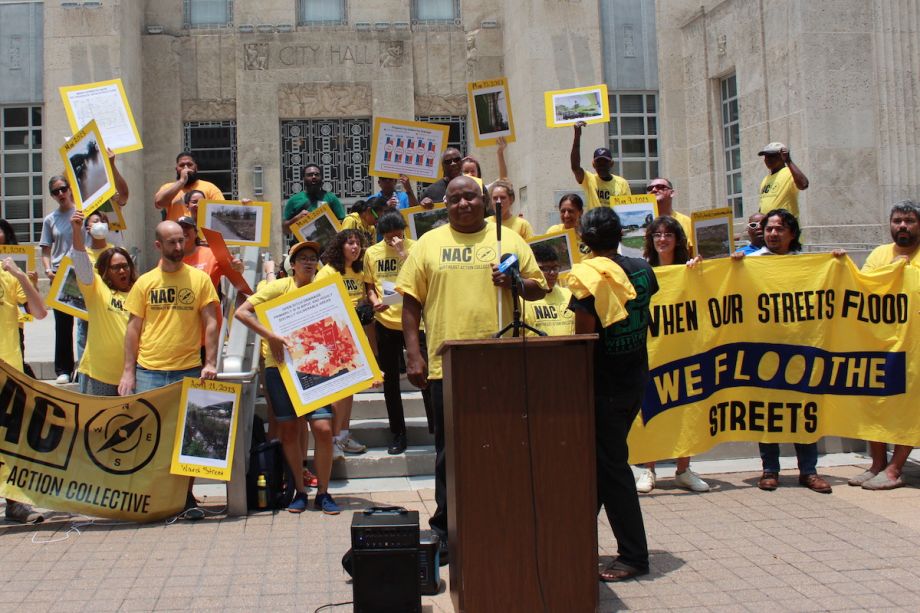Call it “drainage justice.” In Houston, Black and brown residents have scored a victory: $20 million dollars in new funding for the Local Drainage Program, along with the city’s pledge to take responsibility for maintaining often-clogged open drainage ditches.
About 80% of this sea-level city’s open drainage ditches are in communities of color, and for decades, these neighborhoods have dealt with frequent street flooding that turned into weeks of standing water breeding mosquitoes, spreading pollutants and impeding travel. During worse storms, this water also backs up into garages and homes.
The new funding and city-led maintenance amounts to a public acknowledgement that this is an issue that needs to be dealt with, and the money and maintenance moves will go a long way to remediating the problem as climate change leads to increased severe rainfall events.
It wasn’t an easy fight. But what we accomplished in Houston offers lessons that underserved communities across the country might find useful and even inspiring.
Organizing — and beyond that, building a sense of community and solidarity — was essential to this victory. West Street Recovery — a neighbors’ organization that sprang up after the devastation of Hurricane Harvey in 2017 — and the Northeast Action Collective joined with over a dozen organizations plus committed individuals to gather information, figure out the solutions that would best serve their own communities, and keep meeting with officials in public and in private until they acted.
Maintaining hope while also remaining honest about the urgency of the problem was essential for the long-term engagement that made the campaign successful. We are fortunate to have community members with a gift for encouraging their neighbors to keep working together over the long haul. That kind of good energy ended up being just as important as the scientific and technical evidence we gathered to support our case.
It shouldn’t be so hard to get such an obvious problem fixed, but that’s the way the world so often works. We found that we needed to get into the weeds of regulations and budgeting, and file Freedom of Information Act requests when information wasn’t forthcoming. Sometimes members of council or their staff members said we were getting too detailed during our meetings.
The truth is that elected officials are too busy to gain expertise in drainage regulation – so we did it for them.
Even though our efforts were ultimately successful, they revealed just how undemocratic city processes can be. Instead of budgeting processes and drainage governance guidelines being straightforward and transparent, they are convoluted and opaque. So, for example, we had to figure out that compared to other categories of funding, Local Drainage Project funding allowed for more extensive projects and for targeting neighborhoods most in need. And while in theory there are opportunities for city residents to provide input, too often the meetings offered are poorly facilitated or don’t have a process in place to follow up on concerns that residents raise.
So we were persistent. We helped dozens of residents speak before city council. There’s a power in hearing neighbor after neighbor speak, especially when you know they had to take time out of their workday, pay for parking, perhaps arrange for childcare, and wait their turn just to speak for three minutes.
In addition to speaking at public meetings, over half of city councilors responded to our request to meet with them or their staff in private, which allowed us to be forthright in telling them our needs and answering their questions.
To be fair, not one person in city government said that frequently clogged open drainage ditches that never got maintained didn’t constitute a problem. But to turn that agreement into action, we needed to present solutions and demand that they be enacted, time and time again.
We also worked to secure news coverage. To turn a problem as persistent as flooding and as seemingly mundane as infrastructure into a story that outlets were willing to cover, we marshaled facts, visuals and local voices to clearly explain the problem and sketch out sensible solutions.
This kind of persistent and collaborative community-based advocacy, backed with research and paired with practical solutions, can help advance drainage justice, environmental justice, and all kinds of justice work. But it’s also true that this work is never completely done.
We are celebrating our win for now. And then it will be time to make sure implementation proceeds as promised, and that our neighborhoods will be drier, safer and more resilient to the challenges of a changing climate.
Felix Kapoor is co-director of operations, rebuild efforts and community organizing at West Street Recovery, which connects communities with the resources that they need to be resilient, secure and stronger than before. Alice Liu is West Street Recovery’s co-director of communications, rebuild and fundraising. Both are also active in the Northeast Action Collective, which works with northeast Houston residents on issues of inadequate drainage.








